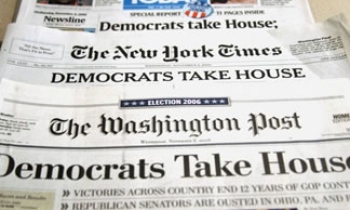The Valle del Cauca department in western Colombia has one of the highest rates of press freedom violations in the country, forcing journalists into silence, the Foundation for Press Freedom (Fundación para la Libertad de Prensa, FLIP) has found. According to the analysis, from 2003 to mid-2007, 50 violations were documented: 35 journalists were threatened, five of whom fled into exile; and three journalists were killed.
Cali is the city with the highest level of human rights violations in the department. Threats, intimidation, assaults and attempted murder by members of armed groups, or by corrupt politicians seeking to conceal their crimes, has led to the widespread practice of self-censorship by journalists in the region. "Here, one can only publish official pronouncements because to investigate puts one in danger," Blanca MarÃa Torres, editor of the newspaper El Caleño, said.
On February 20, La Razón editor Edgar Buitrago was saved from an attempt on his life by the intervention of his security escort. The then-commander of the Valle police, General Luis Alberto Moore, denied it was the editor who had been targeted, maintaining instead that the assailants were trying to settle a score with his bodyguards. Edward Alzate, the departmental representative for the state intelligence agency (Departamento Administrativo de Seguridad, DAS), said his agency never dismissed the possibility that the journalist was the target.
Pablo Arbelaez, editor of an independent media outlet, received a death threat from an unidentified source, after investigating corruption in the departmental administration. When he sent his newspaper containing the report to the printer, he received a telephone call in which he was threatened that his newspaper will be shut down .The threats were repeated weeks later, when two men entered his office and warned him that, if he did not leave the city, he would be killed.
In another incident, the editor of the newspaper Q'Hubo, Rubén DarÃo Valencia, received threats in June, from a drug boss in Buenaventura: Olmes Durán, alias "El Doctor". According to what the journalist told FLIP, the threats stemmed from his reporting on the drug-trafficker's having been detained by police.

In the port city of Buenaventura, armed groups vying for control over the drug trade tried to assassinate more than 100 people in 2006. Journalists who are supposed to be protected under a special government programme complain that precautionary measures, such as police patrols around journalists' homes and places of work, are no longer being taken.
By no means do the cases documented by FLIP represent all of the press freedom violations in the region. The reasons for which not all violations get reported are many. Journalists do not take some incidents seriously, or do not recognise them as violations. Sometimes, they are afraid to report them, or do not trust the authorities. A few of them have quoted that they feel there will be no backing of the media outlet for which they work if they complain.
Many are even unfamiliar with the process of registration of complaint and other formalities. Another very important reason of less reporting of such incidents is the corruption. The police, district attorneys, local administration and office of Vice President Francisco Santos told FLIP that they receive few complaints of threats against journalists. But journalists in the department say that the official bodies often have links with illegal, armed groups active in the area.
In the meetings of representatives of police department, the DAS, the local administration and the office of the country's vice-president, they agreed to the fact that journalism faces serious threats in Cali and Valle del Cauca and a mechanism has to be established to receive complaints from journalists. They are in contact with the leaders of journalists' unions for the same.









